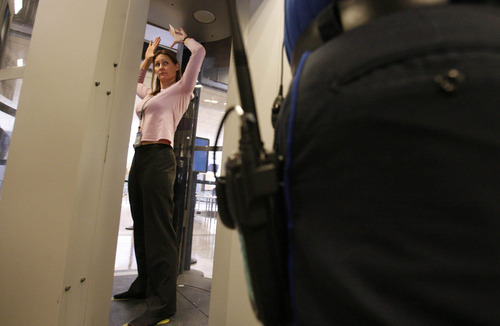This is an archived article that was published on sltrib.com in 2011, and information in the article may be outdated. It is provided only for personal research purposes and may not be reprinted.
Washington • Transportation Security Administration officials during a hearing before Rep. Jason Chaffetz and other congressional critics got a taste Wednesday of what some travelers experience when ordered to pass through a see-through-your-clothes body scanner and then undergo a pat-down by a burly officer.
Chaffetz and his fellow Oversight and Government Reform members took turns over several hours detailing their concerns — and their own personal horror stories — with TSA operations. Committee Chairman Darrell Issa, R-Calif., noted that he had carried a small pair of scissors on airplanes some 380 times but only a few weeks ago had them confiscated by TSA despite the fact they fit within the agency's guidelines.
Rep. Blake Farenthold, R-Texas, complained he recently got taken to a back room to be "thoroughly searched" because he accidentally moved during a body scan. And Farenthold took time to display photos of intense pat-downs, including two of young children. "There are people who would go to jail for touching a child like that," Farenthold charged.
Alaska state Rep. Sharon Cissna, who had undergone a mastectomy after breast cancer, noted how she had refused a pat-down in Seattle and ended up on a four-day return journey to Juneau because TSA said she couldn't fly commercially.
The Democrat likened TSA's hands-on approach to criminal assault, and that recovering from such a pat-down was like dealing with post-traumatic stress disorder.
TSA officials had initially backed out of testifying after Chaffetz, a Utah Republican who was chairing the hearing, refused to move them off a panel with a group that has five pending lawsuits against the agency. But Chaffetz relented and the officials took the witness stand, alone, to defend their difficult mission: protecting the public while not inflaming them.
The officials — Robin Kane, who oversees TSA's technology, and Lee Kair, the assistant administrator over security operations — stressed that the nearly 500 whole-body imaging machines at 78 airports are safe and that there is no ability to capture and store images.
Chaffetz, who has introduced legislation to bar whole-body imaging machines as primary screening devices at airports, keyed in on that and demanded the witnesses swear under oath whether any images had ever been stored or exported. When officials said to the best of their knowledge they were unaware of that happening, Chaffetz wasn't satisfied. "Why isn't the answer to that, 'No, it doesn't even have the capability,' " Chaffetz demanded to know.
Kane and Kair both said it hadn't happened on their watch but that in an early pilot phase the machines could be programmed to store images. They quickly added that ability has since been eliminated.
Both officials took pains to express the threat America faced from enemies looking to exploit security loopholes to attack the nation and cited examples recently of those kind of efforts. Most of the flying public is fine with the security arrangements, they said.
Chaffetz doesn't share that view. The congressman had a run-in with TSA agents at Salt Lake City International Airport in 2008 when he refused to enter one such machine and complained he was given an aggressive pat-down because of his criticism of the agency.
The two TSA officials got a reprieve when committee members were called to a floor vote.
But Chaffetz, while the TSA officials were still under oath, asked twice whether they would agree to come back and testify again. Both said yes, assuring a return trip to Room 2154 of the Rayburn House Office Building.



